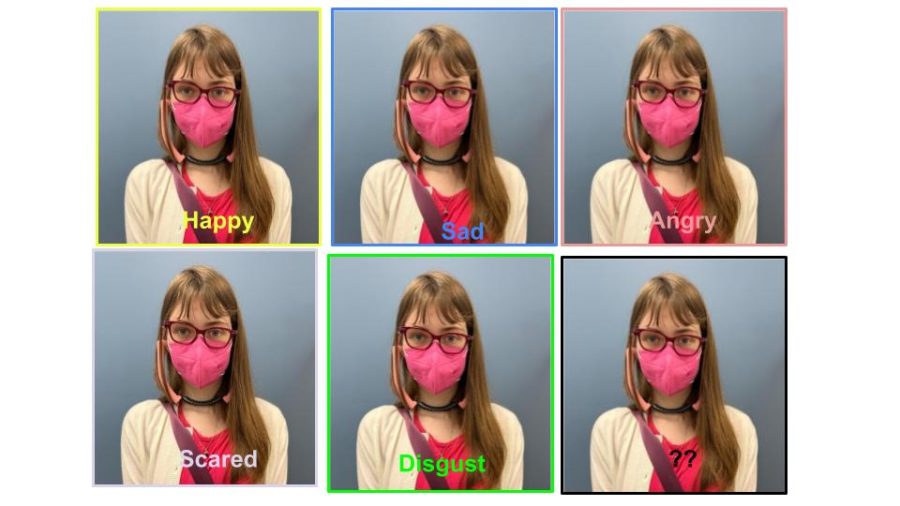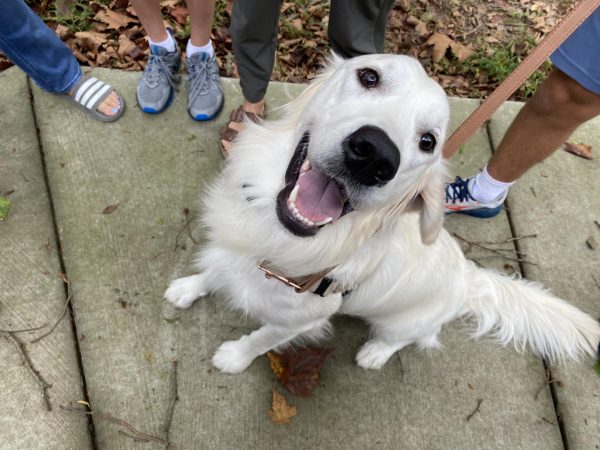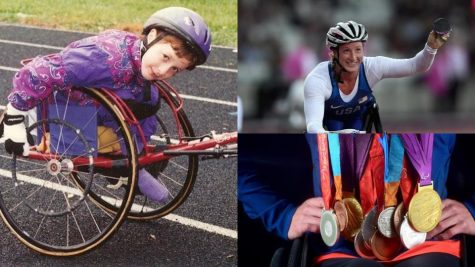An atypical opinion: I’ll keep my mask, thank you.
Author Alexis Simmerman, demonstrates that masks make it hard to decipher emotions from one another, much like how autism and ADHD does.
March 17, 2022
The past two years have been difficult for most people as Covid basically made the world spiral out of control. It’s made it harder for people to actively socialize with others with social distancing, and even with masks, most find it a struggle.
I say most because I’m the biggest exception. For me, Covid was probably more like a haven. I’m not a social person, so online schooling was probably the best thing I could have asked for. If you had asked me how I was doing during that time, my answer would have been “amazing.”
Even before Covid, my brain has always been wired with the struggles that people go through with the masks, thus making socializing a challenge at best and a nightmare at worst. Honestly, just watching everyone start to complain about the masks and how they impact their lives, I’m just laughing in karmic justice.
People, that’s what I’ve been living with for my entire life. You think two years is bad? Try seventeen.
And that’s also probably why it annoys me so much when people decide not to wear masks as much, because these masks are just a simulation of what I go through on a daily basis. I can’t take off the code in my brain that’s been there since birth, so hearing people complain as much as they do, it honestly irks me.
There are people like me with autism and ADHD who have to deal with similar problems to masking. With or without masking, we still have yet to recognize that these are struggles that real people go through daily, and even now, those people aren’t always treated with the respect they deserve.
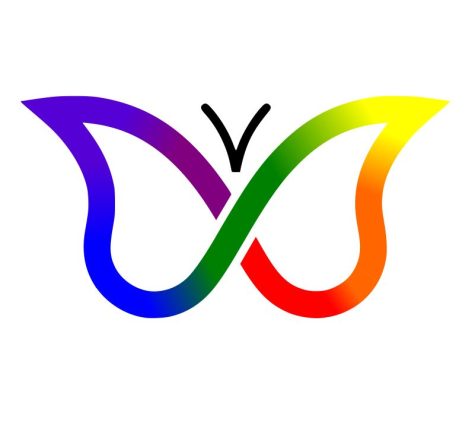
There are people like me with autism and ADHD who have to deal with similar problems to masking. With or without masking, we still have yet to recognize that these are struggles that real people go through daily, and even now, those people aren’t always treated with the respect they deserve.
Autism and ADHD.
Autism has a lot of misconceptions, some idiotic, others understandable. It’s a complicated condition, and it’s different for many people, so there is no one way to be autistic. The CDC defines autism as a developmental disability that can cause significant social, communication, and behavioral challenges.
Degrees of these problems can often vary as it is a spectrum, but there are some key symptoms. Typically, people on the spectrum tend to have problems with social, emotional, or communication skills. They have a different way of observing and interacting with the world. They are typically uninterested in conversation, avoid eye contact, and generally opt to be alone. They have trouble understanding facial expressions and the emotions of others, appear unaware when people talk to them and respond in sounds, and have trouble figuring out how to interact
Autistic people can be social. It’s just harder for us because of these pre written codes in our brains. Often a lot of effort is needed to maintain relationships, something that might seem easy to others.
ADHD is another very misunderstood condition.
The CDC defines ADHD as a neurodevelopmental disorder, often characterized by impulsive or inattentive behaviors. While it’s not as directly involved in social challenges, it’s still quite a challenge as this disorder can make personal interaction very susceptible to miscommunication and misunderstanding.
People with ADHD have less of an ability to regulate their behaviors or attention spans, so relationships can often be fragile. Their inattention can be mistaken for apathy, and their hyperactivity and impulsivity can be mistaken for disregard. It’s not easy to make and keep friends.
With all this in mind, it’s not exactly controversial to say that people with autism and ADHD may not be the best in a social setting. I can completely confirm, my social life is nonexistent. I know I am like millions of others. And there is no way to cure any of this. We can develop strategies to improve our social skills, but that takes a lot of trial and error, and it’s not exactly all too great for our emotional state when we have a fail. We have to live with all of these problems, and I’m just one example of the isolation that can arise from such problems.
That’s why coronavirus did not bother me as much as others. Finally, the whole world was experiencing the frustration I experience every day. Masking has some of the same features as what it feels like to be autisic or have ADHD.
Moving mouths.
When it comes to face to face interactions, not many people realize how important it is for them to watch lips. Normally, when people talk, they often watch the lips of the speaker. This makes it easier for the brain to interpret the words with audio and visual cues, and it makes the information it’s receiving that much clearer, helping to establish pitch, tone, and intent.
However, masks hide the mouth from view and muffle the sounds. This creates challenges for most people, as they have a harder time hearing what the other person is saying, and they don’t have the added help of the lip movement. This can lead to miscommunication or disinterest.
Well, remember what I said about ADHD being very susceptible to miscommunication and a short attention span as well? Usually, when people talk to me, my eyes don’t go to their lips, nor their faces. I will either be looking down at their shoes, or if I was busy when they started talking, looking at what I was doing, still working.
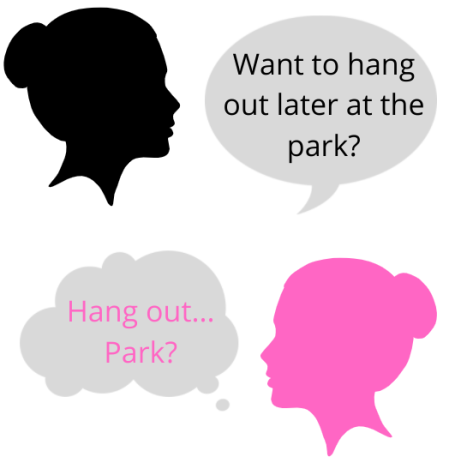
I can hear them fine; it’s just that I might miss out on some words here and there. I’m more likely to forget everything they just said in a matter of seconds, and you’re probably not going to know that I am listening in the first place. I don’t mean to do this. It’s just that my brain is at war when it comes to watching lips move, and I need to put a lot of effort into pushing it into doing something for a prolonged period of time that gives it little satisfaction. I’m listening, I’m just really bad at showing it.
Because of this, I haven’t really noticed much of a change in terms of my being able to hear what others say ability because the masks don’t really impact something my brain just refuses to do. It might be hard for others, but for me it’s whatever.
Confusing Countenance
Nonverbal communication makes up the majority of a person’s communication. Things like hand gestures, body movements, or facial expressions are key to assigning meaning to words and emotions.
However, masks take up like 50% of the overall face. People are finding it harder to read facial expressions, thus making it harder for them to interpret words or phrases into the proper connotation. Emotional perception is greatly affected by this, which can make it seem like people just don’t understand, even when the speaker feels it’s obvious.
For me, those obvious hints aren’t as obvious.
I struggle with facial recognition and expressions. I can determine obvious expressions if they’re clear enough for me. Part of the reason why I like watching animation is because expressions are often made very clear for the viewer, allowing me to more easily determine the emotions of the characters.
In real life, if you asked me which face was disgust and which was anger, there is like a 75% chance I’m going to get it wrong, and the only reason it’s not 50% is because there is a high possibility that I will say both.
So, obviously, relying on faces that it pains me to look at to determine emotions doesn’t work. So how do I figure that out? Believe it or not, it’s all auditory for me. I have different tones assigned to each emotion, and I usually make a different verbal stim depending on my emotions so that someone who knows me well can easily interpret and understand how I’m feeling.
For context, think about the little “hm” that Dolores from Encanto does. That’s basically what it is, except my tone is constantly changing depending on my mood. I listen to the tone of voice the person uses when talking, and I can easily make an assumption on how they’re feeling. I’m much more likely to actually figure out what people are feeling this way, and I’m usually pretty accurate.
I don’t need to look at faces in order to figure out emotions. In fact it’s often to my detriment, so having the masks on is just a thing to me, because facial expressions usually aren’t what I’m looking for.
Basically, the masks are just a mere simulation of just some of the challenges that I’ve had to overcome for my entire life.
People are freaking out about not being able to watch lips or not being able to read facial expressions, when those are just some problems that I’ve had to work around for my entire life.
Because of this, people complaining about the masks just bugs me.
Complain about not being able to properly hear one another or determine emotions? Try not being able to understand expressions properly so that you never understand any of the modern slang your peers use.
Try living with communication that is easy to misinterpret and hard to understand.
My life has basically been masking plus so much more, and I’ve been managing for years in complete silence. So watching them complain because they’re suffering with just some of the problems that I’ve been fighting for 17 years, well, meet karma.
If you can’t comprehend that there are some people in life who go through the struggles of a mask every day of their life( a million other things) then you can’t complain. It’s not like I can complain about my condition. It’s my brain after all, and, like it or not, I’m stuck with it.



